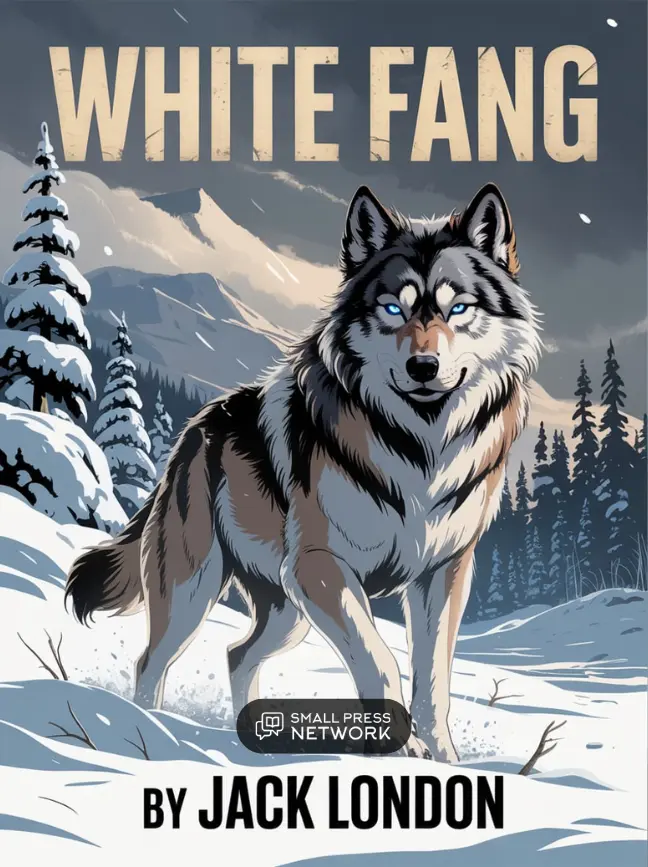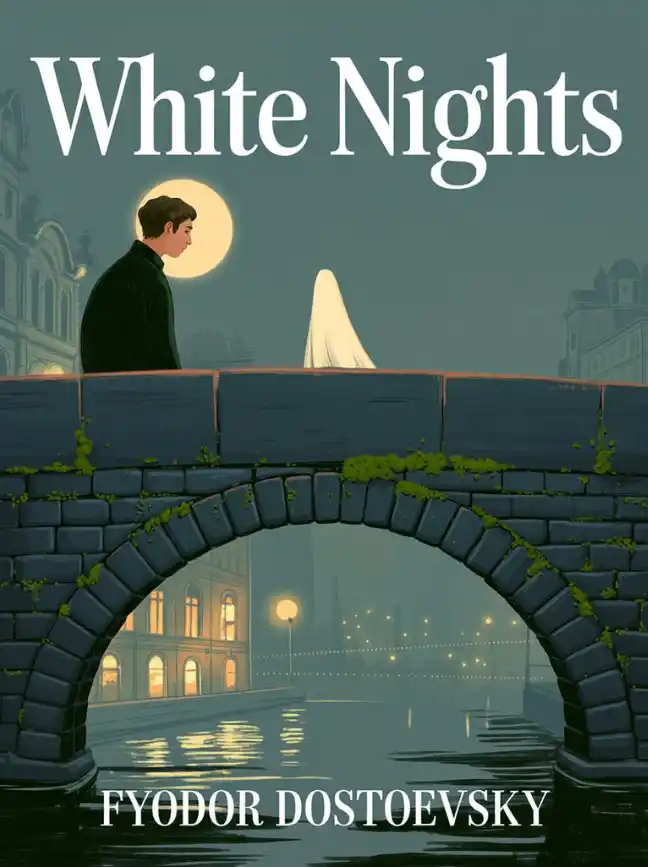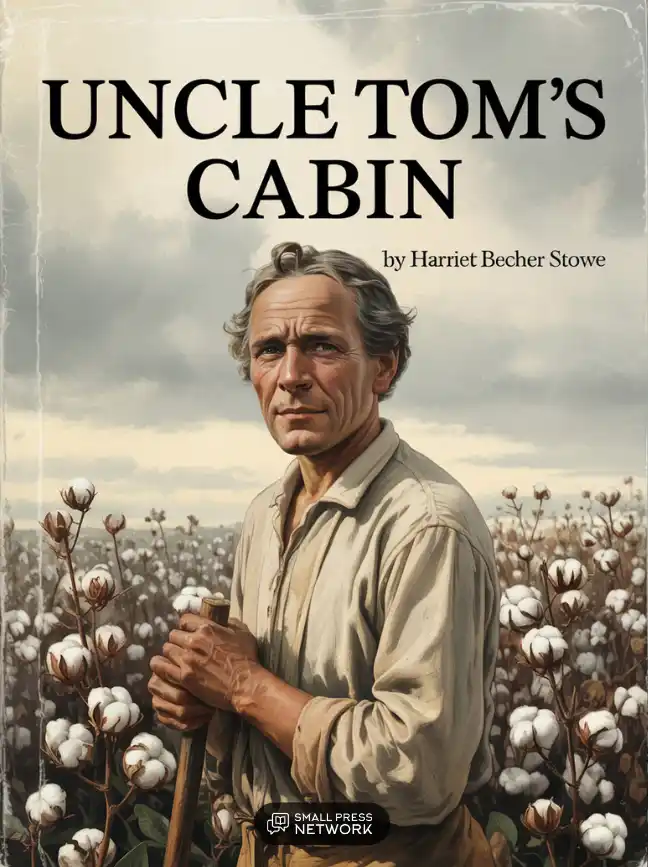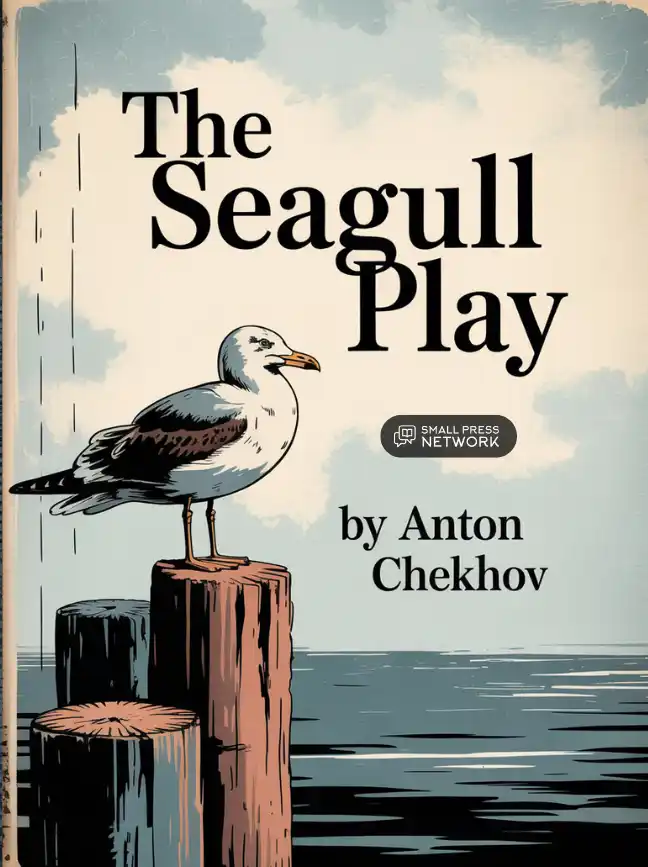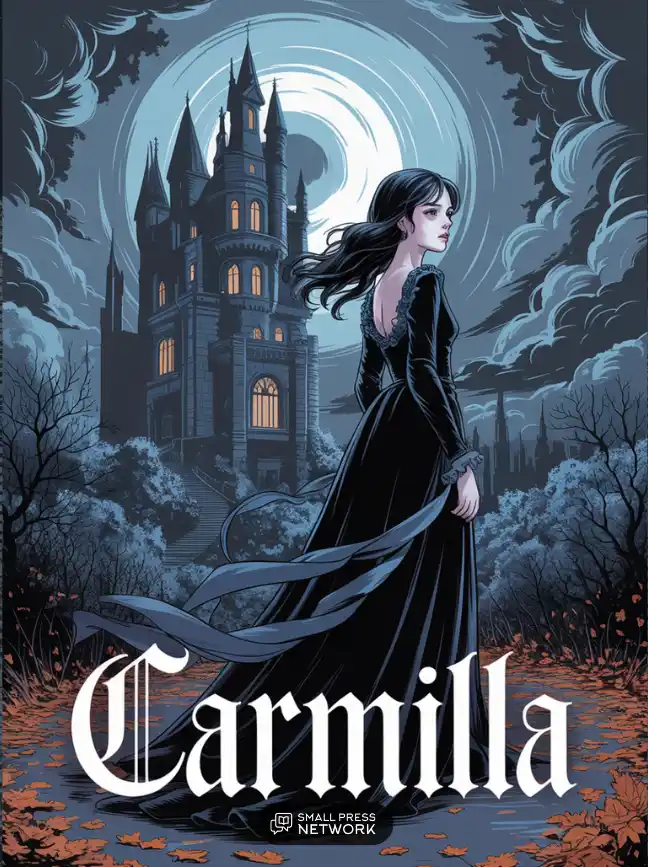C 1
Dark spruce forest frowned on either side the frozen waterway. The trees had been stripped by a recent wind of their white covering of frost, and they seemed to lean towards each other, black and ominous, in the fading light. A vast silence reigned over the land.
The land itself was a desolation, lifeless, without movement, so lone and cold that the spirit of it was not even that of sadness. There was a hint in it of laughter, but of a laughter more terrible than any sadness—a laughter that was mirthless as the smile of the sphinx, a laughter cold as the frost and partaking of the grimness of infallibility. It was the masterful and incommunicable wisdom of eternity laughing at the futility of life and the effort of life. It was the Wild, the savage, frozen-hearted Northland Wild.
But there was life, abroad in the land and defiant. Down the frozen waterway toiled a string of wolfish dogs. Their bristly fur was rimed with frost. Their breath froze in the air as it left their mouths, spouting forth in spumes of vapour that settled upon the hair of their bodies and formed into crystals of frost. Leather harness was on the dogs, and leather traces attached them to a sled which dragged along behind. The sled was without runners. It was made of stout birch-bark, and its full surface rested on the snow. The front end of the sled was turned up, like a scroll, in order to force down and under the bore of soft snow that surged like a wave before it. On the sled, securely lashed, was a long and narrow oblong box. There were other things on the sled—blankets, an axe, and a coffee-pot and frying-pan; but prominent, occupying most of the space, was the long and narrow oblong box.
In advance of the dogs, on wide snowshoes, toiled a man. At the rear of the sled toiled a second man. On the sled, in the box, lay a third man whose toil was over,—a man whom the Wild had conquered and beaten down until he would never move nor struggle again. It is not the way of the Wild to like movement. Life is an offence to it, for life is movement; and the Wild aims always to destroy movement. It freezes the water to prevent it running to the sea; it drives the sap out of the trees till they are frozen to their mighty hearts; and most ferociously and terribly of all does the Wild harry and crush into submission man—man who is the most restless of life, ever in revolt against the dictum that all movement must in the end come to the cessation of movement.
But at front and rear, unawed and indomitable, toiled the two men who were not yet dead. Their bodies were covered with fur and soft- tanned leather. Eyelashes and cheeks and lips were so coated with the crystals from their frozen breath that their faces were not discernible. This gave them the seeming of ghostly masques, undertakers in a spectral world at the funeral of some ghost. But under it all they were men, penetrating the land of desolation and mockery and silence, puny adventurers bent on colossal adventure, pitting themselves against the might of a world as remote and alien and pulseless as the abysses of space.
They travelled on without speech, saving their breath for the work of their bodies. On every side was the silence, pressing upon them with a tangible presence. It affected their minds as the many atmospheres of deep water affect the body of the diver. It crushed them with the weight of unending vastness and unalterable decree.
It crushed them into the remotest recesses of their own minds, pressing out of them, like juices from the grape, all the false ardours and exaltations and undue self-values of the human soul, until they perceived themselves finite and small, specks and motes, moving with weak cunning and little wisdom amidst the play and inter-play of the great blind elements and forces.
An hour went by, and a second hour. The pale light of the short sunless day was beginning to fade, when a faint far cry arose on the still air. It soared upward with a swift rush, till it reached its topmost note, where it persisted, palpitant and tense, and then slowly died
away. It might have been a lost soul wailing, had it not been invested with a certain sad fierceness and hungry eagerness. The front man turned his head until his eyes met the eyes of the man behind. And then, across the narrow oblong box, each nodded to the other.
A second cry arose, piercing the silence with needle-like shrillness. Both men located the sound. It was to the rear, somewhere in the snow expanse they had just traversed. A third and answering cry arose, also to the rear and to the left of the second cry.
“They’re after us, Bill,” said the man at the front.
His voice sounded hoarse and unreal, and he had spoken with apparent effort.
“Meat is scarce,” answered his comrade. “I ain’t seen a rabbit sign for days.”
Thereafter they spoke no more, though their ears were keen for the hunting-cries that continued to rise behind them.
At the fall of darkness they swung the dogs into a cluster of spruce trees on the edge of the waterway and made a camp. The coffin, at the side of the fire, served for seat and table. The wolf-dogs, clustered on the far side of the fire, snarled and bickered among themselves, but evinced no inclination to stray off into the darkness.
“Seems to me, Henry, they’re stayin’ remarkable close to camp,”
Bill commented.
Henry, squatting over the fire and settling the pot of coffee with a piece of ice, nodded. Nor did he speak till he had taken his seat on the coffin and begun to eat.
“They know where their hides is safe,” he said. “They’d sooner eat grub than be grub. They’re pretty wise, them dogs.”
Bill shook his head. “Oh, I don’t know.”
His comrade looked at him curiously. “First time I ever heard you say anything about their not bein’ wise.”
“Henry,” said the other, munching with deliberation the beans he was eating, “did you happen to notice the way them dogs kicked up when I was a-feedin’ ’em?”
“They did cut up more’n usual,” Henry acknowledged.
“How many dogs ’ve we got, Henry?”
“Six.”
“Well, Henry … ” Bill stopped for a moment, in order that his words might gain greater significance. “As I was sayin’, Henry, we’ve got six dogs. I took six fish out of the bag. I gave one fish to each dog,
an’, Henry, I was one fish short.”
“You counted wrong.”
“We’ve got six dogs,” the other reiterated dispassionately. “I took out six fish. One Ear didn’t get no fish. I came back to the bag
afterward an’ got ’m his fish.”
“We’ve only got six dogs,” Henry said.
“Henry,” Bill went on. “I won’t say they was all dogs, but there was seven of ’m that got fish.”
Henry stopped eating to glance across the fire and count the dogs.
“There’s only six now,” he said.
“I saw the other one run off across the snow,” Bill announced with cool positiveness. “I saw seven.”
Henry looked at him commiseratingly, and said, “I’ll be almighty glad when this trip’s over.”
“What d’ye mean by that?” Bill demanded.
“I mean that this load of ourn is gettin’ on your nerves, an’ that you’re beginnin’ to see things.”
“I thought of that,” Bill answered gravely. “An’ so, when I saw it run off across the snow, I looked in the snow an’ saw its tracks.
Then I counted the dogs an’ there was still six of ’em. The tracks is there in the snow now. D’ye want to look at ’em? I’ll show ’em to you.”
Henry did not reply, but munched on in silence, until, the meal finished, he topped it with a final cup of coffee. He wiped his mouth
with the back of his hand and said:
“Then you’re thinkin’ as it was—”
A long wailing cry, fiercely sad, from somewhere in the darkness, had interrupted him. He stopped to listen to it, then he finished his sentence with a wave of his hand toward the sound of the cry, “— one of them?”
Bill nodded. “I’d a blame sight sooner think that than anything else. You noticed yourself the row the dogs made.”
Cry after cry, and answering cries, were turning the silence into a bedlam. From every side the cries arose, and the dogs betrayed their fear by huddling together and so close to the fire that their hair was scorched by the heat. Bill threw on more wood, before lighting his pipe.
“I’m thinking you’re down in the mouth some,” Henry said.
“Henry … ” He sucked meditatively at his pipe for some time before he went on. “Henry, I was a-thinkin’ what a blame sight luckier he is than you an’ me’ll ever be.”
He indicated the third person by a downward thrust of the thumb to the box on which they sat.
“You an’ me, Henry, when we die, we’ll be lucky if we get enough stones over our carcases to keep the dogs off of us.”
“But we ain’t got people an’ money an’ all the rest, like him,” Henry rejoined. “Long-distance funerals is somethin’ you an’ me can’t exactly afford.”
“What gets me, Henry, is what a chap like this, that’s a lord or something in his own country, and that’s never had to bother about grub nor blankets; why he comes a-buttin’ round the Godforsaken ends of the earth—that’s what I can’t exactly see.”
“He might have lived to a ripe old age if he’d stayed at home,”
Henry agreed.
Bill opened his mouth to speak, but changed his mind. Instead, he pointed towards the wall of darkness that pressed about them from every side. There was no suggestion of form in the utter blackness; only could be seen a pair of eyes gleaming like live coals. Henry indicated with his head a second pair, and a third. A circle of the gleaming eyes had drawn about their camp. Now and again a pair of eyes moved, or disappeared to appear again a moment later.
The unrest of the dogs had been increasing, and they stampeded, in a surge of sudden fear, to the near side of the fire, cringing and crawling about the legs of the men. In the scramble one of the dogs had been overturned on the edge of the fire, and it had yelped with pain and fright as the smell of its singed coat possessed the air. The commotion caused the circle of eyes to shift restlessly for a moment and even to withdraw a bit, but it settled down again as the dogs became quiet.
“Henry, it’s a blame misfortune to be out of ammunition.”
Bill had finished his pipe and was helping his companion to spread the bed of fur and blanket upon the spruce boughs which he had laid over the snow before supper. Henry grunted, and began unlacing his mocassins.
“How many cartridges did you say you had left?” he asked.
“Three,” came the answer. “An’ I wisht ’twas three hundred. Then I’d show ’em what for, damn ’em!”
He shook his fist angrily at the gleaming eyes, and began securely to prop his moccasins before the fire.
“An’ I wisht this cold snap’d break,” he went on. “It’s ben fifty below for two weeks now. An’ I wisht I’d never started on this trip, Henry. I don’t like the looks of it. I don’t feel right, somehow. An’ while I’m wishin’, I wisht the trip was over an’ done with, an’ you an’ me a-sittin’ by the fire in Fort McGurry just about now an’ playing cribbage—that’s what I wisht.”
Henry grunted and crawled into bed. As he dozed off he was aroused by his comrade’s voice.
“Say, Henry, that other one that come in an’ got a fish—why didn’t the dogs pitch into it? That’s what’s botherin’ me.”
“You’re botherin’ too much, Bill,” came the sleepy response. “You was never like this before. You jes’ shut up now, an’ go to sleep, an’ you’ll be all hunkydory in the mornin’. Your stomach’s sour, that’s what’s botherin’ you.”
The men slept, breathing heavily, side by side, under the one covering. The fire died down, and the gleaming eyes drew closer the circle they had flung about the camp. The dogs clustered together in fear, now and again snarling menacingly as a pair of eyes drew close. Once their uproar became so loud that Bill woke up. He got out of bed carefully, so as not to disturb the sleep of his comrade, and threw more wood on the fire. As it began to flame up, the circle of eyes drew farther back. He glanced casually at the huddling dogs. He rubbed his eyes and looked at them more sharply. Then
he crawled back into the blankets.
“Henry,” he said. “Oh, Henry.”
Henry groaned as he passed from sleep to waking, and demanded, “What’s wrong now?”
“Nothin’,” came the answer; “only there’s seven of ’em again. I just counted.”
Henry acknowledged receipt of the information with a grunt that slid into a snore as he drifted back into sleep.
In the morning it was Henry who awoke first and routed his companion out of bed. Daylight was yet three hours away, though it was already six o’clock; and in the darkness Henry went about preparing breakfast, while Bill rolled the blankets and made the sled ready for lashing.
“Say, Henry,” he asked suddenly, “how many dogs did you say we
had?”
“Six.”
“Wrong,” Bill proclaimed triumphantly.
“Seven again?” Henry queried.
“No, five; one’s gone.”
“The hell!” Henry cried in wrath, leaving the cooking to come and count the dogs.
“You’re right, Bill,” he concluded. “Fatty’s gone.”
“An’ he went like greased lightnin’ once he got started. Couldn’t ’ve seen ’m for smoke.”
“No chance at all,” Henry concluded. “They jes’ swallowed ’m alive. I bet he was yelpin’ as he went down their throats, damn ’em!”
“He always was a fool dog,” said Bill.
“But no fool dog ought to be fool enough to go off an’ commit suicide that way.” He looked over the remainder of the team with a speculative eye that summed up instantly the salient traits of each animal. “I bet none of the others would do it.”
“Couldn’t drive ’em away from the fire with a club,” Bill agreed. “I always did think there was somethin’ wrong with Fatty anyway.”
And this was the epitaph of a dead dog on the Northland trail— less scant than the epitaph of many another dog, of many a man.

